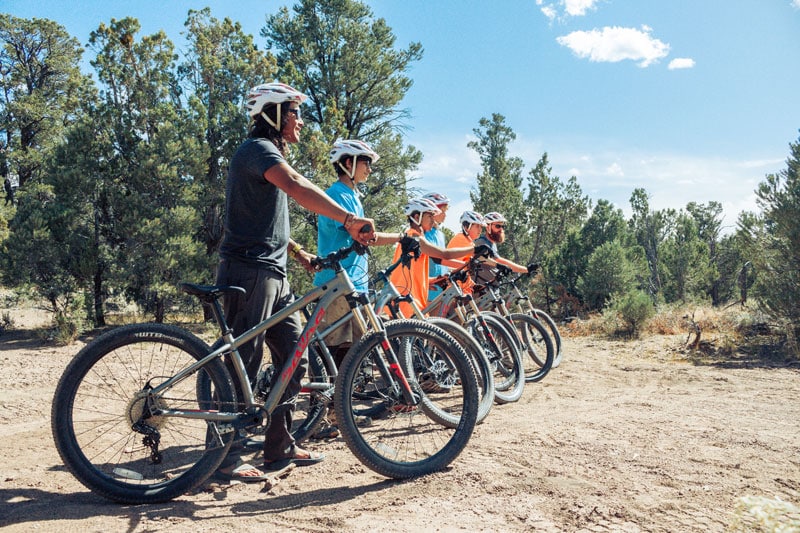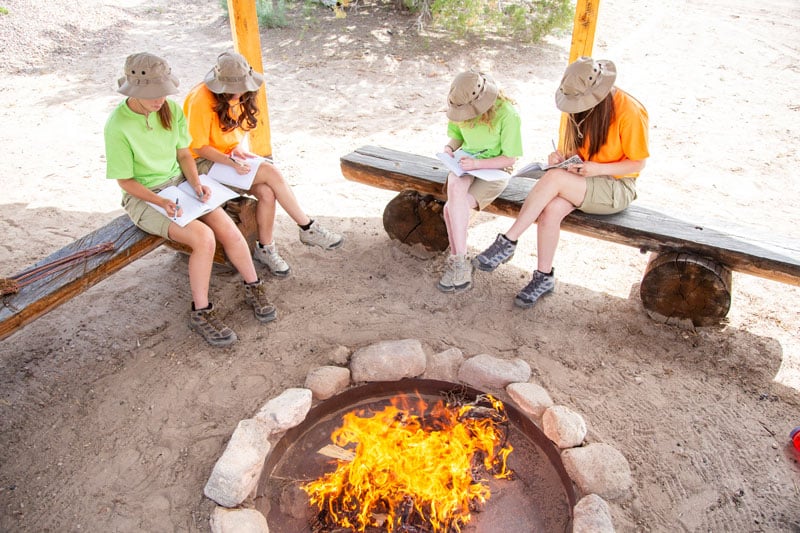
Top Nature Therapy Program for Teens
Discover the Healing Power of Nature Therapy
Did you know that spending time in natural environments can bolster your overall well-being? Nature therapy, or ecotherapy, leverages nature's healing power to improve mental and physical health. This evidence-based method delivers personalized and varied experiences tailored to meet specific therapeutic needs.
Get the Info & Help You Need.
As holistic health methods gain popularity, recognizing how nature therapy works—and its potential benefits—could be transformative for individuals grappling with today’s societal pressures, notably our younger population. Our exploration into nature therapy will cover its definition, scientific underpinnings, practical applications, and the significant effects it may have on a teen’s overall well-being.
As a parent, witnessing your beloved teen struggle with a mental health crisis can be devastating. At ThreePeaks Ascent, we understand the pain and uncertainty you're experiencing. Our nature-based therapy program is specially designed to provide solace, support, and transformative healing for teens in crisis.
Our program combines the therapeutic power of nature with evidence-based clinical interventions to create a unique and effective path to recovery. Nestled amidst serene natural surroundings, our facility offers a safe and supportive environment where teens can connect with themselves, others, and the healing power of nature.
Through our comprehensive program, your teen will:
- Break free from negative patterns and behaviors: By immersing your teen in a novel environment, we disrupt unhealthy habits and empower them to forge a new path.
- Develop essential coping skills: Our experienced therapists will guide your teen in acquiring vital coping mechanisms, equipping them with resilience and self-confidence.
- Discover their inner strength and potential: Nature's tranquility fosters self-awareness and exploration, allowing your teen to reconnect with their core values and strengths.
- Build meaningful connections: Through group activities and family therapy, your teen will establish a community of support and learn the importance of healthy relationships.
- Heal the whole family: We recognize that your teen's struggles impact the entire family. Our program offers support and guidance to families, fostering healing and growth for all.
If you're searching for a transformative solution to your teen's mental health crisis, look no further than ThreePeaks Ascent. Our nature therapy program offers a holistic approach to healing, empowering teens with the tools and support they need to overcome their challenges and thrive.

Schedule a consultation and learn how our nature-based therapy can guide your teen towards a brighter, more fulfilling future.
Learn more about what makes nature therapy so effective at helping teens in crisis.
Nature Therapy: A Pathway to Healing for Teens
Teenagers go through a lot during their adolescent years. It can be a tough time for them mentally and emotionally. That's why nature therapy programs are a great option for those who may struggle in traditional therapeutic settings.
Research shows that being in nature can have a big impact on a teenager's mental well-being, especially for those dealing with mental disorders. These programs allow young people to work at their own pace and participate in activities that meet their specific needs, which helps them build confidence and independence.
The great thing about nature therapy is that it's different for everyone. By spending time in natural spaces and paying attention to their own patterns, teenagers can learn to be more self-aware and find comfort and resilience. It's a way for them to reconnect with themselves and find peace with the world around them. Nature therapy is not just a concept, it's a proven practice that can help teenagers find balance and alignment in their lives.

What is Nature Therapy?
At its core, the practice of nature therapy—or ecotherapy— utilizes the natural world as a means to enhance both an individual’s mental and physical well-being. This therapeutic approach goes beyond merely spending time outdoors. It involves deliberate, mindful activities specifically designed to improve individual health outcomes.
By immersing teens in natural environments and “green and blue spaces” like forests, beaches, mountains, deserts, or even indoor gardens, nature therapy programs provide a rich variety of encounters for personal growth.
Nature therapy’s fundamental qualities enable it to:
- Remove distractions that often disconnect teenagers from their relationships and environment.
- Foster relationships between teens and their environment. It promotes healing and also teaches teenagers to value their surroundings and relationships.
- Shift teenagers' focus away from themselves and help them feel a deep connection to the world around them.
- Help teenagers who struggle with their emotions. It helps them calm their nervous system, be less reactive, and have better emotional control.
- Develop resilience, determination, and a positive mindset in teens while they have fun. This, in turn, builds their self-confidence and empowers them to overcome challenges in all areas of their lives. Whether it's at home, school, with friends, or in their personal lives, nature therapy equips them with the skills they need to conquer any obstacles they may face.

Nature therapy taps into this bond, using peaceful nature sounds, gentle breezes, and refreshing sunsets to improve mental health and promote recovery. This allows them to detach from consuming electronics and reconnect with themselves again. By immersing teens in these natural elements, we leverage a time-tested remedy that brings both peace and healing.
How Does Nature Therapy Work?
Nature-based therapy improves a teen’s emotional well-being, cognitive abilities, and behavior in six stages:
1. Stimulation
Teens found themselves feeling better and refreshed when surrounded by nature. Natural environments had a five-sensory effect on them, evoking emotions like happiness, fascination, curiosity, and joy. Their senses and sensibilities were restored. Adolescents who experienced this positive stimulation were more likely to actively and frequently visit natural environments. So, the experience of positive stimulation in nature is a crucial starting point for healing and transformation. During the stimulus stage, teens often describe the experience using words related to positive emotions like mood, beauty, refreshment, pleasure, joy, and fascination were present.
2. Acceptance
During this stage, teenagers feel comforted and at ease in nature. It's a place where they can find solace and relaxation. Nature accepts them for who they are, just like a mother's warm embrace. When they emotionally connect with nature, they find relief from their busy and overwhelming lives. It opens their minds and provides emotional stability. Teenagers often describe the experience using words like friendship, comfort, relaxation, and emotional support.
3. Purification
During the purification process, teenagers can let go of their negative emotions. They find solace in the quiet forest, where they can release their negative energy and feel lighter emotionally. This helps them relieve stress and let go of pain and anger. Being in nature allows them to forget their worries and truly reflect on their own feelings. They can share stories from their heart, something they may not normally do with others. By connecting with nature, their minds and emotions are cleansed and they become more relaxed and open. Purification plays a crucial role in providing insight and many teenagers describe the experience as a release or a disappearance of their negative emotions.
4. Insight
Insight is a crucial and meaningful step in nature-based therapy. It allows teens to awaken and connect with themselves through self-reflection and meditation in nature. They gain clarity on their true desires and discover a new way of living. This stage also helps them reclaim their identity and find purpose in their struggles. The key aspect here is a profound shift in their thinking. This "change of thought" empowers teenagers to choose a new path in life. During this stage, they often describe the experience as a journey of deep thinking, self-discovery, and understanding their dreams.
5. Recharging
The recharging stage fills teens with hope, courage, and confidence. It affects both their mind and body. In this stage, nature therapy helps teens develop a strong desire to live a healthy life. The positive energy they gain helps them overcome challenges and start fresh. With this renewed energy, they can confidently thrive in a world they once feared or avoided. Teenagers often describe this stage as powerful, hopeful, energizing, courageous, confident, vigorous, and revitalizing.
6. Change
The final stage is Change. During this stage, teenagers experience mental and physical recovery and transformation. They are able to make positive changes in their relationships, find new employment opportunities, and achieve personal growth and accomplishments. Moreover, their perspective on life may also change, leading to a more positive outlook and a more fulfilling life. These changes ultimately result in self-discovery and a sense of renewal. Teenagers often describe this stage as a period of improvement, happiness, healing, and positivity.
These six stages of nature-based therapy can be simplified into three main components:
- communication with nature
- communication with oneself
- and communication with the world.
When teenagers engage in communication with nature, it helps foster positive emotions. Similarly, communication with oneself triggers cognitive changes. As a result, teens who experience emotional and cognitive shifts in the natural environment are more likely to have a richer and healthier communication with the world, which encompasses daily activities, social interactions, and relationships with others.
What is the theory of nature therapy?
A wealth of research theories explain the effectiveness underlying nature therapy. These include:
- Biophilia - Humans have an instinctual desire to connect with nature and all living things, known as biophilia. This intrinsic connectedness to nature and its inhabitants is genetically encoded. Scientists support the biophilia hypothesis, finding that immersing oneself in nature can decrease stress, boost focus, spark imagination, and increase overall contentment and joy.
- Ecopsychology & Interdependence - Ecopsychology is a field that studies how our connection with nature affects our mental well-being. It recognizes that when we disconnect from nature, we suffer both environmentally and psychologically. However, when we reconnect with nature, we can experience healing and emotional connection.
- Attention Restoration Theory (ART) - Have you ever felt mentally exhausted from having to concentrate on something for too long? This is called directed attention fatigue. Attention Restoration Theory states that spending time in nature or simply looking at nature scenes can improve a person's concentration. ART is based on the idea that directed attention, which requires mental effort, can become fatigued. Exposure to natural environments encourages more effortless attention, allowing the directed attention capacity to replenish.
- Mindfulness - Nature therapy guides people to immerse themselves in the sights, sounds, and sensations of the natural world. It redirects their focus from dwelling on the past or worrying about the future. By doing so, it fosters a sense of being fully present and engaged in the moment. Mindfulness is an essential aspect of nature therapy, encouraging people to observe their experiences with an open mind, curiosity, and without judgment. It helps people to be present in their experiences without attempting to alter or avoid them.
- Sense of Place - Nature therapy is about forming an emotional bond with natural environments known as "sense of place". This bond provides comfort, joy, and a sense of belonging. It's a dynamic relationship influenced by individual differences, experiences, and social factors. You can develop this connection through sensory perception or repeated experiences. This bond can transfer to other natural environments and promote personal well-being and environmental stewardship. Building a strong sense of place through nature therapy can help teens find meaning and emotional resilience.
- Awe & Transcendence - Encountering something vast and powerful that's beyond our usual experience creates a sense of awe. This emotion is an essential component of the positive impact of nature therapy. In natural environments, experiencing awe has been proven to reduce stress and symptoms of PTSD, promote social integration, personal well-being, and provide a sense of time abundance. Awe also helps foster a connection to nature and transcendence of the self. This is why natural surroundings have therapeutic effects, as awe triggers a shift in perspective, making us feel part of something bigger.
- Self-Efficacy & Overwhelming Mastery Experiences - Believing in one's own ability to succeed is known as self-efficacy. Nature therapy can help boost self-efficacy by providing opportunities for reflection and self-discovery. By participating in activities like gardening and plant care, individuals can feel a sense of competence and discover new interests. Nature therapy also promotes a positive mindset, improving overall well-being, while practicing mindfulness can increase self-awareness and a sense of self-efficacy. In teens, nature therapy fosters mastery experiences and helps them interpret events in a symbolic way, leading to a greater sense of self-acceptance and confidence.
- Flow - Flow is the mental state of being completely absorbed, focused, and enjoying an activity. This results in a transformation of one's sense of time and a feeling of effortless action. Engaging in flow experiences is intrinsically rewarding and can lead to positive feelings, personal growth, and peak experiences. Nature therapy can facilitate flow by providing the right balance of challenges and skills, promoting focused attention on the present, and captivating the senses. Activities such as hiking, gardening, and mindful walking can help people enter a flow state more easily and enjoy the additional benefits of reduced stress, improved cognitive functioning, and enhanced well-being.
- Grit & Growth Mindset - Grit refers to the ability to persevere in the face of setbacks. Meanwhile, a growth mindset is the belief that skills can be developed through hard work and dedication. Nature therapy provides various ways for individuals to develop these qualities, such as through gardening, hiking, or mindful walking. By engaging in activities that provide a sense of competence and self-efficacy, people can cultivate passion and perseverance. Moreover, nature therapy can reinforce the idea that skills and attributes can be improved through effort, which is crucial to developing a growth mindset. Participants may also see their personal growth and development reflected in nature, promoting self-understanding and belief in one's ability to change. Additionally, nature therapy can promote positive emotions, reduce stress, and overall well-being, reinforcing the idea that one has the resources to overcome challenges. Overall, nature therapy is a holistic way to develop grit and a growth mindset, equipping teens with the tools needed for personal growth.
- Identity Development - Teens facing mental health challenges can benefit from nature therapy's impact on identity development. Activities like gardening or hiking offer a sense of accomplishment, boosting confidence. Nature's cycles can also symbolize personal growth, fostering self-understanding and change. Nature therapy reduces stress, creating a space for teens to navigate challenges. Connection to nature and mindfulness further enhance self-awareness, aiding identity exploration. A strong therapist-teen relationship provides a safe space for this crucial development stage.
What is the Purpose of Nature Therapy?
Nature therapy utilizes nature's healing power to improve teenagers' mental and emotional well-being. But what exactly do nature therapy programs aim to achieve? Here are the main goals and purposes of these programs:
- Improving Teen Mental Health and Well-being: Nature therapy programs aim to address mental health issues like anxiety, depression, and stress by leveraging the restorative and therapeutic benefits of interacting with natural environments. The goal is to promote psychological healing and enhance overall well-being.
- Fostering Connectedness and Relationship Building: Nature therapy programs seek to facilitate a stronger sense of connection - both to the natural world and to other people. This can involve building interpersonal skills, promoting social integration, and developing a deeper appreciation for the environment.
- Facilitating Personal Growth and Identity Development: Nature-based therapy programs provide the ideal environment to catalyze personal growth, self-discovery, and identity development, especially in populations like teens and young adults struggling with mental health crises.
- Providing Accessible and Cost-Effective Interventions for Families: Nature therapy is a relatively easy, cost-effective, and accessible way to address mental health needs, especially in comparison to more traditional clinical approaches.
Types of Nature-Based Therapies
Therapies that are rooted in nature employ a range of practices to harness the healing potential inherent within natural environments. Although ThreePeaks Ascent doesn’t incorporate all of these nature therapies, nature-based programs may utilize the following techniques:

- Nature-based residential treatment: immersed in nature & free from distractions, teens with mental, emotional, & behavioral struggles work with seasoned therapists to heal & gain the skills needed to thrive with their families.
- Adventure Therapy: This involves engaging in outdoor activities like hiking, rock climbing, rafting, etc. to explore nature and promote personal growth in an individual or group setting.
- Animal-Assisted Therapy/Interventions: These approaches incorporate interactions with animals, such as petting, feeding, or building a therapeutic relationship with animals like dogs or horses.
- Arts and Crafts in Nature: This combines creative activities like painting, sculpture, or using natural materials (e.g. clay, grass, wood) with the natural environment as inspiration and setting.
- Blue Mind Therapy: Interactions with aquatic environments, such as being near oceans, rivers, or lakes, which have been shown to have a psychologically restorative effect and promote calm and tranquility.
- Conservation-Based Therapy: This pairs physical exercise with the protection and restoration of natural spaces.
- Dark Nature Therapy: Activities in this type take place at night, such as stargazing.
- Green Exercise or Green Therapy: This involves physical activities like walking, running, or cycling in green spaces like parks or forests.
- Therapeutic Farming: Participants engage in farming activities like growing crops or caring for farm animals.
- Horticulture Therapy/Therapeutic Horticulture: This focuses on therapeutic gardening and growing plants. Horticultural therapy can lead to activities like selling produce at a farmer's market.
- Wilderness Therapy: This often involves group-based programs for teens and young adults with behavioral issues, taking place in wilderness settings.
- Forest Bathing/Therapy or Shinrin-Yoku: A mindful practice of using the five senses to fully immerse oneself in a forest environment.
- Nature Walks and Nature Meditation: Simple activities like mindful walking or sitting meditation in natural settings.
Different nature-based programs offer therapeutic benefits for specific recovery needs and personal preferences. Each approach utilizes the environment to improve well-being by tapping into our inherent connection with the natural world. Overall, these programs channel the power of nature to promote human health and happiness.
What Can Nature Therapy Help Treat?
Incorporating nature into the realm of mental health treatment, ecotherapy augments standard therapeutic practices by offering a natural form of healing. Ecotherapy yields positive outcomes for various mental health problems such as:
- Anxiety and Stress - Nature therapy offers a powerful remedy for teen anxiety. By incorporating stress reduction techniques, physical activity, mindfulness practices, awe-inspiring experiences, supportive environments, and social connection, this therapy can enhance overall mental well-being. Our compassionate and professional approach is designed to provide teens with a sense of calm and help them cultivate a more positive outlook on life.
- Depression - Nature therapy can effectively combat teen depression by incorporating stress reduction techniques, physical activity, mindfulness practices, awe-inspiring experiences, supportive environments, and social connections. These elements work together to improve the mental health outcomes of individuals battling depression. We understand how challenging it can be to overcome depression, and we believe that nature therapy can provide a holistic approach that helps individuals find relief and hope.
- Attention Deficit Hyperactivity Disorder (ADHD), Nature therapy can be a powerful tool in helping those who struggle with ADHD. It has been shown to improve concentration, reduce hyperactivity, and boost emotional well-being. Additionally, it can complement other evidence-based treatments. The calming and restorative effects of nature can help address the complex challenges of ADHD.
- Trauma & Post-traumatic Stress Disorder (PTSD) - Spending time in nature can help teens who have experienced trauma. This is because it lowers stress hormones and negative feelings, making them feel more calm. It also encourages mindfulness and focusing on the present moment, which can reduce intrusive thoughts and flashbacks. By safely connecting with nature and other people, teens can rebuild a sense of safety and belonging, which promotes overall healing.
- Level 1 Autism - Nature therapy can help children with autism improve their social skills, boost their self-esteem, reduce anxiety, and minimize maladaptive behaviors. By immersing themselves in the natural world, these children can experience profound benefits for their emotional and mental well-being. If you're looking for ways to support a child with autism, consider incorporating outdoor activities and exposure to nature into their daily routine. It could make a significant difference in their quality of life and overall development.
- Anger Management - Teens struggling with anger can benefit from outdoor mental health therapy. Physical activities like hiking release pent-up energy, while mindfulness practices help manage emotions before outbursts. Nature itself reduces stress hormones, calming the body's anger response. Completing tasks in nature builds confidence and a sense of control, potentially reducing anger from perceived lack thereof. Nature provides a safe space to process anger without judgment, and group activities can improve communication and healthy expression of anger.
- Substance Abuse / Addiction - Nature therapy is an effective tool for teenagers in recovery. Engaging with the outdoors helps to decrease stress, a frequent trigger for substance abuse. By immersing themselves in nature, teens can cultivate healthier strategies to deal with challenging emotions. Nature also enhances mood and cultivates social connections, reducing feelings of isolation and fostering a positive environment for recovery.
- Low self-esteem - Nature therapy can be a powerful tool for teens struggling with low self-esteem. Outdoor therapy activities provide a sense of accomplishment, boosting confidence. Nature itself can also inspire positive self-reflection, leading to greater self-acceptance. By reducing stress and anxiety, nature therapy creates a calmer state that fosters a better self-image. Spending time with others outdoors can build positive social connections, further enhancing self-worth.
- Technology Addictions - A nature therapy center can unplug teens from technology. By taking a break from devices, teens can refocus on the present moment through activities like hiking. Nature also reduces stress, a common trigger for tech overuse. Spending time outdoors with others fosters social connections, lessening reliance on technology for social interaction. Overall, nature therapy promotes well-being, making healthy tech habits easier to establish.
Therapeutic Benefits of Nature Therapy
Nature therapy goes beyond mere symptomatic relief, embracing a comprehensive view of well-being that impacts all areas of one’s life. Its application in healthcare for everything from easing stress to managing long-term ailments is gaining recognition due to its substantial health advantages. These include:
Improved Mental Health
The psychological rewards of connecting with the natural world are manifold and profound. Engaging regularly with natural settings allows individuals to reap a variety of mental health benefits, including:
- Reduced Stress and Anxiety: Nature therapy has been shown to lower activity in the brain linked to negative thoughts, which can reduce stress and anxiety.
- Reduced Depression: Nature-based therapy significantly decreases self-reported symptoms of depression and the severity of diagnoses.
- Improved Mood: Participants in nature therapy report improvements in mood and overall mental well-being.
- Developing Healthy Coping Skills: Engaging with nature helps develop resilience and effective coping strategies for stress and adversity.
- Building Self-Esteem and Resilience: Nature therapy enhances self-esteem and resilience by providing mastery experiences and challenges.
- Reconnecting with Themselves and the World: Nature therapy increases individuals' connectedness to nature and enhances their self-awareness and identity.
- More Opportunities for In-Person Social Connection: Nature therapy often involves group activities that enhance social connections and physical health.
- Mindfulness and Reduced Rumination: Spending time in nature and green spaces increases mindfulness, which in turn reduces stress and depressive rumination.
- Reduced Social Comparison: Nature environments provide a break from environments that foster social comparison, thus improving mental health.
- Decreased Exposure to Harmful or Disturbing Content: Nature therapy offers a healthy escape from potentially harmful digital content.
- Reduced Risk of Social Media Addiction: Regular engagement in nature-based activities can reduce dependence on social media and improve mental health.
- Lower Prevalence of High Psychosomatic Symptoms: Nature therapy has been shown to reduce the prevalence of psychosomatic symptoms.
- Improved Sense of Adventure and Exploration: Nature therapy encourages physical activity and exploration, which is beneficial for a teen’s mental health.
- Environmental Stewardship and Connection: Regular interaction with nature can foster a sense of responsibility and care for the environment.
- Development of Life Skills: Nature-based activities promote the development of practical life skills, contributing to overall well-being.
- Leadership Development: Group activities in nature can enhance leadership skills through cooperative tasks and challenges.
- Appreciation for Simplicity: Engaging with the natural world can foster an appreciation for simplicity, reducing materialistic concerns and promoting physical well-being.
Enhanced Cognitive Function
The Attention Restoration Theory suggests that spending time within natural settings can rejuvenate our mental energy, thereby boosting concentration, working memory, and adaptability—faculties frequently drained by routine life pressures. Spending time in a natural setting can provide the following cognitive benefits:
- Improved Focus and Attention: Nature therapy helps restore attention and focus, particularly benefiting those with attention deficits.
- Increased Self-Awareness: Activities in nature help individuals gain a deeper understanding of themselves, enhancing self-awareness.
- Enhanced Creativity and Problem-Solving: Natural settings stimulate cognitive function, enhancing creativity and problem-solving skills.
- Improved Academic Performance: Nature therapy can positively impact academic performance by improving concentration and reducing stress.
Physical Health Advantages
Nature therapy offers cardiovascular and physical health benefits as well. Engaging in outdoor activities like hiking or practicing mindfulness amidst nature can lead to:
- Improved Nervous System Regulation: Green therapy contributes to better autonomic nervous system balance, enhancing overall health.
- Improved Body Image and Appreciation: Spending time in nature can improve body image and promote a healthier relationship with one's physical self.
- Reduced Cortisol Levels: Engaging with nature has been found to lower cortisol levels, a stress hormone.
- Improved Heart Rate Variability: Nature therapy has been shown to improve heart rate variability, a marker of heart health and stress resilience.
- Reduced Sympathetic Tone: Exposure to natural environments can reduce sympathetic nervous system activity, which is beneficial for cardiovascular health.
- Reduced Systematic Inflammation: Regular nature therapy sessions can lead to reductions in systemic inflammation, improving overall physical health.
- Improved Blood Pressure: Time spent in natural settings has been associated with lower blood pressure, reducing the risk of heart disease.
- Improved Sleep Quality and Duration: Exposure to natural environments is associated with better sleep patterns and quality, which is crucial for a teen’s mental and physical health.
Benefits of Nature-Based Therapy for Families
Nature therapy isn't just about fun in the sun; it's a journey towards healing and growth. Family life can be busy and stressful. Screens can pull us apart, and communication can suffer. Nature therapy offers a chance for teens to reconnect with their authentic selves and prioritize reconnecting with their family in a beautiful and calming setting. Key benefits include:
- Improved Communication: Learn effective communication skills to better understand each other.
- Emotional Regulation: Develop healthy ways to manage stress and difficult emotions.
- Greater Self-Awareness: Gain a deeper understanding of yourselves and each other.
- Boosted Confidence and Self-Esteem: Build a stronger sense of self-worth individually and as a family.
- Strengthening Family Bonds: Through weekly family therapy, teens and their families can
- Spark Open Communication: Nature can spark meaningful conversations that go beyond the everyday.
- Build Stronger Bonds: Shared experiences and challenges create lasting memories and deepen connections.
- Celebrate Each Other: Time spent together allows families to appreciate each other's strengths and unique qualities.
- Being outdoors can help teens cope with a variety of family challenges, including, grief and loss, and family conflict.
How do you practice nature therapy?
Embracing the natural environment in everyday life can be both easy and beneficial. Engaging in activities such as walking or cycling through local green spaces, nurturing a garden, meditating in the fresh air, or enjoying outdoor meals offers daily reinforcement of nature prescriptions that bolster public health and personal well-being. Nocturnal pursuits like observing stars, gardening by moonlight, and spending nights outdoors also provide distinct health advantages and offer alternative insights into the natural world.
ThreePeaks Ascent stands as an exemplar for merging nature therapy with standard clinical therapeutic sessions to foster profound recovery among adolescents.
The approach at ThreePeaks Ascent is more than an isolated session. It’s an ongoing personalized experience woven into participants’ healing journey. Teens can engage with nature through:
- Daily engagement with outdoor nature activities can be achieved through walks or bike rides in local parks, gardening, meditating outdoors, reading a book in a garden, having picnics in natural settings, or hiking nearby terrains.
- Nighttime outdoor activities like stargazing, moon gardening, and camping are valuable additions to nature therapy practices, providing unique health benefits similar to those obtained during the day.
- Practicing mindfulness while connecting with nature, such as through attentive breathing and observing natural surroundings, enhances physical and mental well-being.

Nature Therapy Activities at ThreePeaks
At ThreePeaks Ascent, we believe nature therapy is most effective when it's a personalized and engaging experience for your teen. Here's a glimpse into how we tailor nature therapy to support your teen's healing journey:

- Mindful Exploration: We incorporate mindfulness practices like guided walks and nature journaling. These activities encourage your teen to be present in the moment, connect with their senses, and gain a deeper understanding of their thoughts and feelings.
- Adventure Activities: Depending on your teen's interests and abilities, we might incorporate activities like hiking or rock climbing. These experiences promote a sense of accomplishment, build confidence, and foster teamwork skills.
- Creative Expression: Nature provides a wellspring of inspiration. We may encourage creative expression through activities like nature photography, sketching, or creating art from natural materials. This allows teens to explore their emotions and gain a deeper understanding of themselves.
- Sensory Experiences: Nature offers a multitude of sights, sounds, smells, and textures. We may utilize sensory awareness exercises to help your teen ground themselves in the present moment and reduce anxiety.
- Group Activities: Connecting with peers in a natural environment fosters a sense of belonging and social support. Group activities like campfires or team challenges can be powerful tools for promoting communication and social skills.
- Individualized Approach: Our therapists work closely with your teen to tailor the nature therapy experience to their specific needs and goals. This ensures a safe and supportive environment where your teen feels comfortable exploring their challenges and developing healthy coping mechanisms.
By combining these practices with traditional therapy sessions, ThreePeaks Ascent creates a comprehensive program that harnesses the power of nature to promote lasting healing for your teen.
Why Choose ThreePeaks Ascent's Nature-based Therapy Program for Teens
Taking the Next Step:
If you're a parent or guardian of a teenager struggling with mental or emotional challenges, finding the right help can be overwhelming. ThreePeaks Ascent is here to help. Our nature-based residential treatment program may be just what your child needs, and our experienced team is available to answer any questions you may have.
We know that taking this step for your teen's recovery and future prospects is crucial. With our comprehensive support and a nurturing natural environment, your child will begin a journey towards healing and well-being.
Our program expertly combines clinical excellence with the therapeutic benefits of nature, offering your teen the best chance for emotional growth and success. Don't hesitate to contact us today to learn more about how our program can benefit your family. Together, we can help your teen thrive.

Frequently Asked Questions
About the Author
Every teen's strengths and challenges are different. Complete the no-obligation assessment below to help us understand your family's needs.
We respect your privacy. We will not share your information.
We're here to help - take the first step and contact us to see if Nature-Based Short-Term Residential Treatment could be the path to healing for your family.


